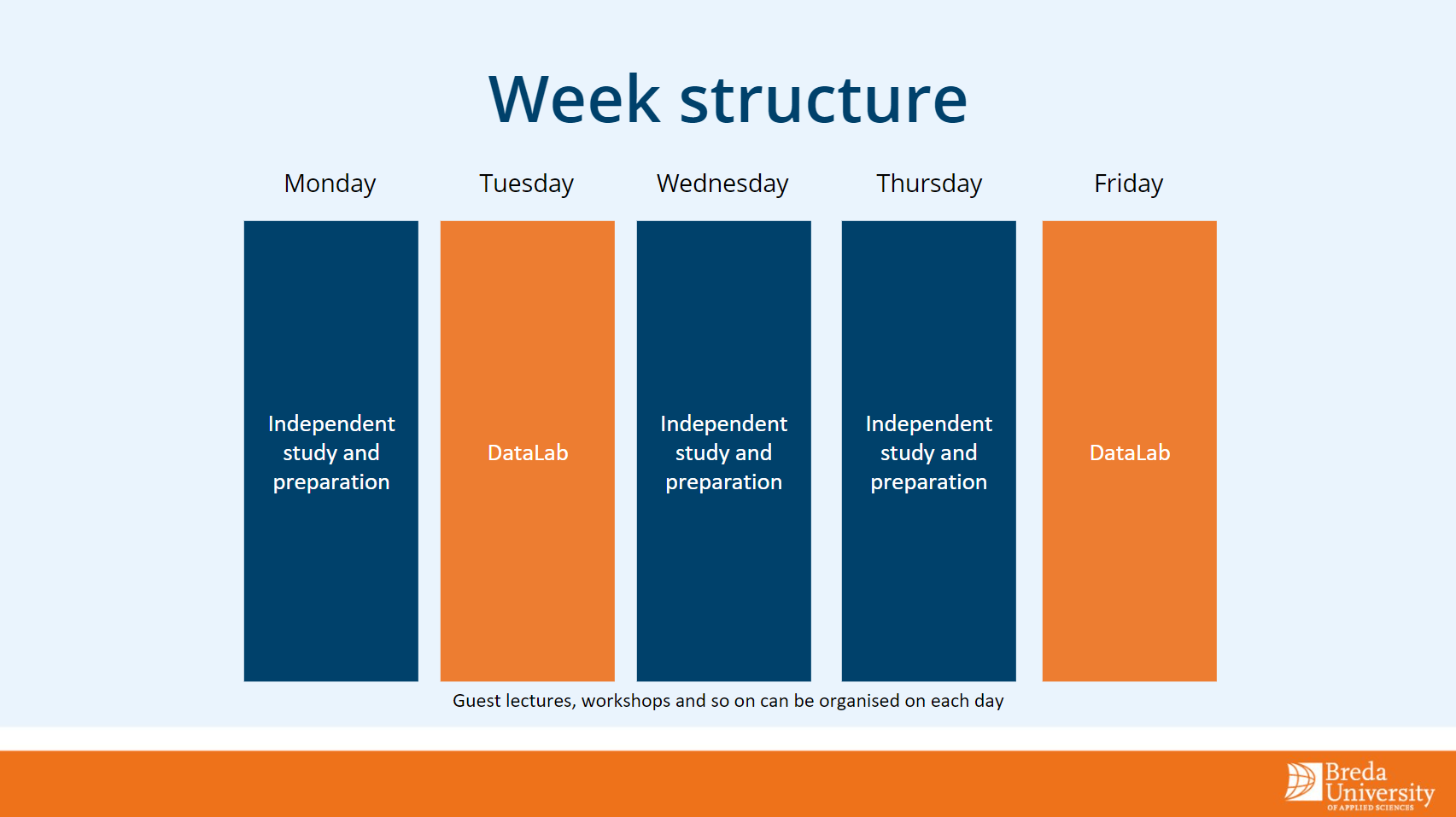Come and meet us
Walking around on campus is the best way to truly experience BUas. Sign up for one of the upcoming events or activities.
Distinctive feature of small-scale and intensive education
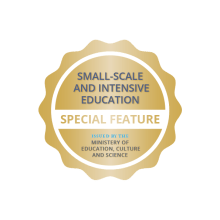
The Applied Data Science & Artificial Intelligence programme at BUas has been recognised by the NVAO as ‘small-scale and intensive’. This means for you:
- Best ADS&AI programme in the Netherlands according to the National Student Survey 2025
- Personal guidance in small, international teams – you receive intensive coaching from experienced instructors
- Real practice from day one – work on projects with data from external partners
- Fast transition to work or master's – graduates quickly find jobs or continue to top programmes such as aivancity in Paris
- Selection based on motivation – you study with students who, like you, want to make an impact
It’s a challenging programme, but it gives you everything you need to truly make a difference with data.
Do you think you would enjoy working with data and artificial intelligence?
Discover if Applied Data Science & Artificial Intelligence is right for you with our quiz.
- It only takes 3 minutes
- Your result in seconds
- Learn more about Applied Data Science & AI
Study overview
The first year consists of four blocks. They cover basic skills that build towards tightly defined projects to enhance your knowledge. Topics that will be discussed are:
- AI & Future markets
- Project & change management
- Data Science
- Mathematics & Statistics
- Programming in Python
- Data interface design
Two days a week you work on projects in DataLab.
A complete overview of the curriculum, courses, content descriptions and learning objectives can be found in the study guide. Below, we explain what you can expect in each year.
Year 2
In the second year, you will attend four blocks in which you continue to develop your skills in your chosen role: Data Scientist, Data Engineer or Analytics Translator. During this year, you will also spend two days a week working in the DataLab.
Year 3
During the first half of the third year, which consists of two blocks, you will work full-time on projects in the DataLab, specialising further in your chosen role. In addition, you will delve into a specific application area, such as Data Science & Logistics, Built Environment, Media or Games. You will also have the opportunity to go on exchange in the first half of the year. In the second half of the third year, you will do a placement.
Year 4
In your graduation year, you will work on two projects. You can choose from several options: work on your portfolio, both individually and as part of a team (with individual assessment), undertake a project at a company where you deliver a concrete result, write a business plan or start your own company supported by our specialists in entrepreneurship, or spend a semester on exchange at one of our partner universities. You can also combine two of these projects into a year-long project. Alternatively, you may gain a year’s work experience in a graduation internship.
- Placement
In the second half of the third year, you will undertake a work placement. What’s more, you can choose to complete a graduation internship in the fourth year. During your placement, you will gain practical experience and discover what suits you best. The programme has an international network which offers a wide range of work placements, both at home and abroad. You can make use of this network or look for a suitable placement yourself. The Student Affairs team will support you in your search for a placement.
- Exchange
Studying abroad is the perfect opportunity to push your boundaries. You build up an international network, learn a new language, and gain insight into intercultural differences. BUas works with universities all over the world, so as an exchange student you have plenty of options. Some examples are:
- St. Polten University (St. Polten, Austria)
- Jyväskylä University of Applied Sciences (Jyväskylä, Finland)
- Kristiania University College (Norway)
- SUPSI (Switzerland)
- Northern Arizona University (Flagstaff, US)
- Minor
With a minor, you choose for yourself: do you want to specialise in your field or broaden your knowledge? You can take a minor at BUas, but you can also choose to do a minor at another Dutch university of applied sciences, or even abroad.
The programme uses the method of project-based education. This means that you gain your knowledge and skills by investigating a complex question, problem or challenge over a period of time. As a result, you learn how to analyse a problem and how to use different resources to arrive at a good solution.
During this programme, you will develop into a data specialist, AI programmer or project manager/consultant. In a digital learning environment, you will learn to gain knowledge and insights from data using specific methods, processes and systems. You will also gain a broad knowledge of artificial intelligence.
Depending on your chosen role, you will develop skills in technology and consulting. The study programme has adopted a project-driven education method. Throughout all four years of study, you will work on various data projects in a simulated DataLab, both individually and with other students.
The Applied Data Science & Artificial Intelligence bachelor’s programme of BUas is the first in the Netherlands to focus on the practical implementation of Artificial Intelligence. The programme is challenging and demanding, requiring long days either on the BUas campus or at a placement host company. Keep in mind that this study programme will take up a lot of your time. We are looking for students who are genuinely interested in the field.
- A typical week
Below, you will find an example of a typical week. Keep in mind that this schedule may vary each week, and this example serves as an indication.
Monday – Independent study day
- 09.00-17.00: You acquire knowledge via the digital learning environment
Tuesday – DataLab day
- 09.15-09.30: Stand-up session in which we discuss what we worked on the previous day and what we are going to do today
- 09.30-10.00: We plan the week ahead – what do we need to do to ensure that we deliver the project on time
- 10.00-12.00: Project work
- 12.00-13.00: Lunch
- 13.00-17.00: More project work
Wednesday – Independent study day
- 09.00-17.00: You acquire knowledge via the digital learning environment
Thursday – Independent study day
- 09.00-17.00: You acquire knowledge via the digital learning environment
Friday – DataLab day
- 09.15-09.30: Stand-up session
- 09.30-12.00: Project work
- 13.00-14.00: Lecture on the current part of the project by one of the lecturers
- 14.00-17.00: More project work
Student well-being
BUas encourages and helps you to make the most of yourself, whatever your circumstances. Maybe you have a chronic illness, are a family carer, a competitive athlete, or juggle your studies with running your own business? Our study coaches, student counsellors and student psychologists are here to help. Do you need extra support or advice? Or extra facilities? Then take a look at the options here.
Team roles
In practice, AI and data projects are not carried out by individuals, but mainly by teams of specialists. Such a team typically consists of a Data Scientist, a Data Engineer and an Analytics Translator. In each project, you choose one of these roles:
- Data Scientist uses statistics and machine learning to make predictions and address key business
- Data Engineer builds and optimises the systems that allow Data Scientists to perform their work
- Analytics Translator delivers value by taking data and communicating the results to help make business decisions
Many of the sectors that BUas trains for are being radically changed by the emergence of AI applications. A few examples:
In urban development, AI applications in smart cities can increase well-being. In logistics, smart inventory management and forecasting, integration of companies through data (industry 4.0) in combination with robotised warehouses ensure more efficient (and more labour-intensive) production. In the media industry, adaptive interfaces ensure that content and advertising are better tailored to individual users. Similarly, the tourism and hospitality industry aim to better tailor their offers to individuals. Chatbots directed by AI contribute to this. AI can contribute to problems such as over-tourism through smart approaches to crowd management.
In the third year, students choose an application area. They are taught relevant sector knowledge and the role of data in workshops. In the DataLab they work on the solution of a problem from the chosen sector.
During the programme, we combine theory with practice. Students visit companies such as Banijay Benelux and the Netherlands Plant Eco-phenotyping Centre (NPEC), where they see how data science and AI work in practice – from media analysis to high-tech plant research. Inspiring and educational!
- After pre-university education (vwo)
As a pre-university education (vwo) graduate, you can obtain your bachelor’s degree in Applied Data Science & Artificial Intelligence in just three years. That will save you a year of time and tuition fees!
What does the three-year track for pre-university education graduates look like?
In just three years, you can obtain a full bachelor’s degree. This accelerated programme is designed to equip you with all the essential professional skills. Throughout the programme, you will follow a structured development track focused on enhancing both your personal and professional leadership abilities.How to apply for the fast track?
Apply via Studielink and select: Applied Data Science & Artificial Intelligence (English-taught / after pre-university education, 3 years).Want to learn more about the three-year track for pre-university education graduates?
Feel free to reach out via email: [email protected].- After a propaedeutic certificate (professional or academic)
You are also eligible for a three-year track if you have obtained a propaedeutic certificate from an Applied Mathematics / Engineering Mathematics programme (professional higher education (hbo) level). You will then start in the second year of the regular programme. You can submit a higher-year request via Studielink.
How to submit a higher-year request?
If you wish to submit a higher-year request, you should first select Applied Data Science & Artificial Intelligence (English-taught / regular track, 4 years) and then indicate in the dropdown menu that you wish to start in an ‘advanced year’.
At BUas, you develop your entrepreneurial skills in all programmes. You can also join BUas Startup Support (BUSS), where you attend networking meetings and receive guidance from a startup coach.
Would you like to graduate with your own company? You can do that at any academy, although a selection procedure may apply. Whether you are already generating revenue or just have an initial idea, BUas Startup Support will help you.
Read more about starting your own business.
- Year 1
-
The first year consists of four blocks. They cover basic skills that build towards tightly defined projects to enhance your knowledge. Topics that will be discussed are:
- AI & Future markets
- Project & change management
- Data Science
- Mathematics & Statistics
- Programming in Python
- Data interface design
Two days a week you work on projects in DataLab.
A complete overview of the curriculum, courses, content descriptions and learning objectives can be found in the study guide. Below, we explain what you can expect in each year.
- Years 2, 3 and 4
-
Year 2
In the second year, you will attend four blocks in which you continue to develop your skills in your chosen role: Data Scientist, Data Engineer or Analytics Translator. During this year, you will also spend two days a week working in the DataLab.Year 3
During the first half of the third year, which consists of two blocks, you will work full-time on projects in the DataLab, specialising further in your chosen role. In addition, you will delve into a specific application area, such as Data Science & Logistics, Built Environment, Media or Games. You will also have the opportunity to go on exchange in the first half of the year. In the second half of the third year, you will do a placement.Year 4
In your graduation year, you will work on two projects. You can choose from several options: work on your portfolio, both individually and as part of a team (with individual assessment), undertake a project at a company where you deliver a concrete result, write a business plan or start your own company supported by our specialists in entrepreneurship, or spend a semester on exchange at one of our partner universities. You can also combine two of these projects into a year-long project. Alternatively, you may gain a year’s work experience in a graduation internship.- Placement
In the second half of the third year, you will undertake a work placement. What’s more, you can choose to complete a graduation internship in the fourth year. During your placement, you will gain practical experience and discover what suits you best. The programme has an international network which offers a wide range of work placements, both at home and abroad. You can make use of this network or look for a suitable placement yourself. The Student Affairs team will support you in your search for a placement.
- Exchange
Studying abroad is the perfect opportunity to push your boundaries. You build up an international network, learn a new language, and gain insight into intercultural differences. BUas works with universities all over the world, so as an exchange student you have plenty of options. Some examples are:
- St. Polten University (St. Polten, Austria)
- Jyväskylä University of Applied Sciences (Jyväskylä, Finland)
- Kristiania University College (Norway)
- SUPSI (Switzerland)
- Northern Arizona University (Flagstaff, US)
- Minor
With a minor, you choose for yourself: do you want to specialise in your field or broaden your knowledge? You can take a minor at BUas, but you can also choose to do a minor at another Dutch university of applied sciences, or even abroad.
- Teaching method
-
The programme uses the method of project-based education. This means that you gain your knowledge and skills by investigating a complex question, problem or challenge over a period of time. As a result, you learn how to analyse a problem and how to use different resources to arrive at a good solution.
During this programme, you will develop into a data specialist, AI programmer or project manager/consultant. In a digital learning environment, you will learn to gain knowledge and insights from data using specific methods, processes and systems. You will also gain a broad knowledge of artificial intelligence.
Depending on your chosen role, you will develop skills in technology and consulting. The study programme has adopted a project-driven education method. Throughout all four years of study, you will work on various data projects in a simulated DataLab, both individually and with other students.
- Study load and coaching
-
The [nhtv:strAIDM] bachelor’s programme of BUas is the first in the Netherlands to focus on the practical implementation of Artificial Intelligence. The programme is challenging and demanding, requiring long days either on the BUas campus or at a placement host company. Keep in mind that this study programme will take up a lot of your time. We are looking for students who are genuinely interested in the field.
- A typical week
Below, you will find an example of a typical week. Keep in mind that this schedule may vary each week, and this example serves as an indication.
Monday – Independent study day
- 09.00-17.00: You acquire knowledge via the digital learning environment
Tuesday – DataLab day
- 09.15-09.30: Stand-up session in which we discuss what we worked on the previous day and what we are going to do today
- 09.30-10.00: We plan the week ahead – what do we need to do to ensure that we deliver the project on time
- 10.00-12.00: Project work
- 12.00-13.00: Lunch
- 13.00-17.00: More project work
Wednesday – Independent study day
- 09.00-17.00: You acquire knowledge via the digital learning environment
Thursday – Independent study day
- 09.00-17.00: You acquire knowledge via the digital learning environment
Friday – DataLab day
- 09.15-09.30: Stand-up session
- 09.30-12.00: Project work
- 13.00-14.00: Lecture on the current part of the project by one of the lecturers
- 14.00-17.00: More project work
Student well-being
BUas encourages and helps you to make the most of yourself, whatever your circumstances. Maybe you have a chronic illness, are a family carer, a competitive athlete, or juggle your studies with running your own business? Our study coaches, student counsellors and student psychologists are here to help. Do you need extra support or advice? Or extra facilities? Then take a look at the options here. - Team roles
-
Team roles
In practice, AI and data projects are not carried out by individuals, but mainly by teams of specialists. Such a team typically consists of a Data Scientist, a Data Engineer and an Analytics Translator. In each project, you choose one of these roles:- Data Scientist uses statistics and machine learning to make predictions and address key business
- Data Engineer builds and optimises the systems that allow Data Scientists to perform their work
- Analytics Translator delivers value by taking data and communicating the results to help make business decisions
Many of the sectors that BUas trains for are being radically changed by the emergence of AI applications. A few examples:
In urban development, AI applications in smart cities can increase well-being. In logistics, smart inventory management and forecasting, integration of companies through data (industry 4.0) in combination with robotised warehouses ensure more efficient (and more labour-intensive) production. In the media industry, adaptive interfaces ensure that content and advertising are better tailored to individual users. Similarly, the tourism and hospitality industry aim to better tailor their offers to individuals. Chatbots directed by AI contribute to this. AI can contribute to problems such as over-tourism through smart approaches to crowd management.
In the third year, students choose an application area. They are taught relevant sector knowledge and the role of data in workshops. In the DataLab they work on the solution of a problem from the chosen sector.
- Excursions and field trips
-
During the programme, we combine theory with practice. Students visit companies such as Banijay Benelux and the Netherlands Plant Eco-phenotyping Centre (NPEC), where they see how data science and AI work in practice – from media analysis to high-tech plant research. Inspiring and educational!
- Study track after vwo or hbo
-
- After pre-university education (vwo)
As a pre-university education (vwo) graduate, you can obtain your bachelor’s degree in Applied Data Science & Artificial Intelligence in just three years. That will save you a year of time and tuition fees!
What does the three-year track for pre-university education graduates look like?
In just three years, you can obtain a full bachelor’s degree. This accelerated programme is designed to equip you with all the essential professional skills. Throughout the programme, you will follow a structured development track focused on enhancing both your personal and professional leadership abilities.How to apply for the fast track?
Apply via Studielink and select: Applied Data Science & Artificial Intelligence (English-taught / after pre-university education, 3 years).Want to learn more about the three-year track for pre-university education graduates?
Feel free to reach out via email: [email protected].- After a propaedeutic certificate (professional or academic)
You are also eligible for a three-year track if you have obtained a propaedeutic certificate from an Applied Mathematics / Engineering Mathematics programme (professional higher education (hbo) level). You will then start in the second year of the regular programme. You can submit a higher-year request via Studielink.
How to submit a higher-year request?
If you wish to submit a higher-year request, you should first select Applied Data Science & Artificial Intelligence (English-taught / regular track, 4 years) and then indicate in the dropdown menu that you wish to start in an ‘advanced year’.
- Entrepreneurship
-
At BUas, you develop your entrepreneurial skills in all programmes. You can also join BUas Startup Support (BUSS), where you attend networking meetings and receive guidance from a startup coach.
Would you like to graduate with your own company? You can do that at any academy, although a selection procedure may apply. Whether you are already generating revenue or just have an initial idea, BUas Startup Support will help you.
Read more about starting your own business.
What makes this study programme unique

Obtain your bachelor’s and master’s in an accelerated track
Thanks to BUas's collaboration with aivancity in Paris and JADS in Den Bosch, you can move directly from your Applied Data Science & Artificial Intelligence bachelor’s programme to a master's programme. Through aivancity, you can obtain both your professional bachelor's degree and a Master of Science in Artificial Intelligence & Data Science or Data Engineering & Cloud Computing in four or five years. Through JADS, the track takes five or six years and you will obtain an MSc in Data Science in Business & Entrepreneurship.
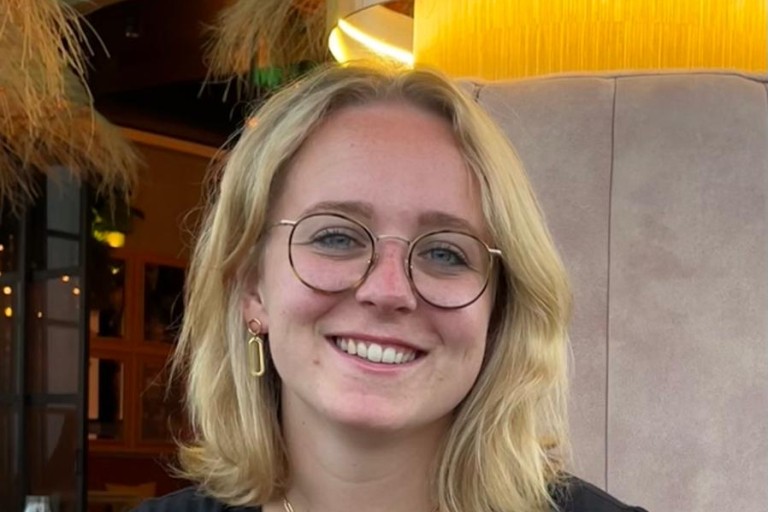
Lecturers from the field
Our Applied Data Science & AI programme equips students with the latest data science techniques. Lecturers like Myrthe Buckens, a former data scientist at Banijay Benelux, collaborate with students on projects such as analysing viewer ratings and social media sentiment for TV programmes.
Admission & application
- What are the admission requirements?
-
To be admitted to this degree programme, you need a higher general secundary education (havo) or pre-university education (vwo) diploma with an appropriate profile, or an equivalent of these Dutch diplomas. You can also be admitted with a secundary vocational education (level-4 mbo) diploma. If you do not meet these requirements, you can have a look at the options available to you.
- What does this study programme cost?
-
In the academic year 2026-2027 the statutory tuition fee for this bachelor programme is €3,650. In addition, you should take extra costs for software, excursions, etc. into account.
- How can I apply?
-
If you meet the admission requirements, you can apply for this study programme. This is a selection programme, meaning that only 125 students are admitted each academic year.
What others say about Data Science & AI

We are not too stressed about exams!
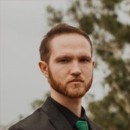
I love to do that and it’s rewarding
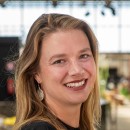
With insights into data we can create a better world

Your future starts here
- The job market needs you
Explore your career options in data science & AI - Choose your path
Will you become a Data Scientist, AI Engineer or Data Consultant? - Learn from the best
Graduates share their experiences
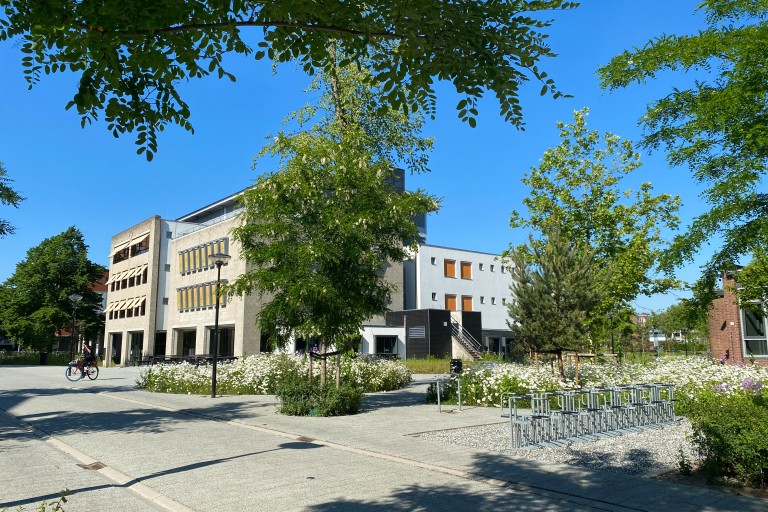
Virtual campus tour
We are proud of our campus. Have a virtual look and discover the Frontier building where you’ll be studying and what more the campus has to offer.
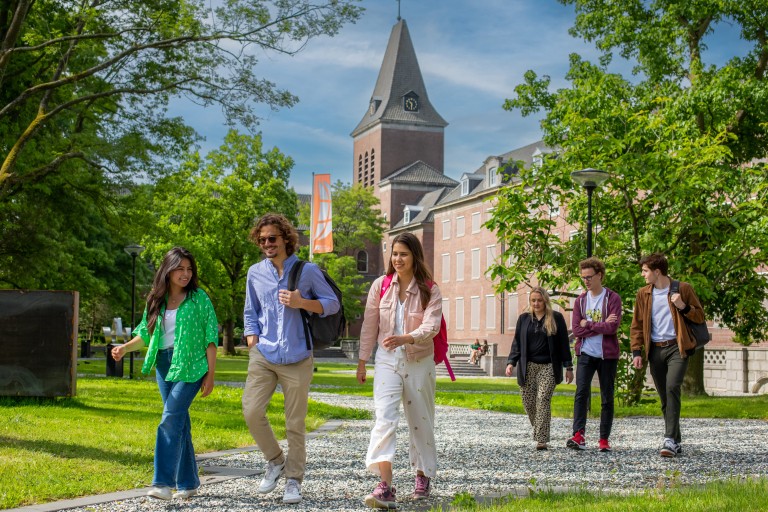
Studying at BUas
What is it like studying at BUas? What does the campus look like and what activities can be undertaken? Is Breda actually a vibrant university town?
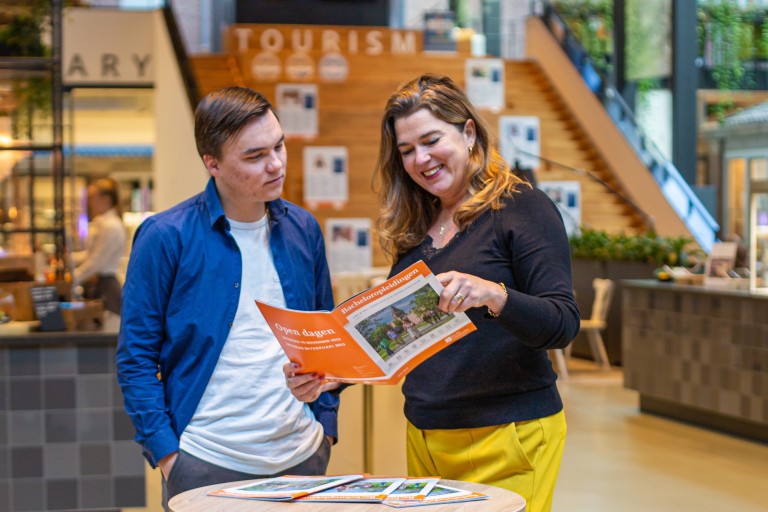
Assistance in choosing your study programme
Do you already know exactly what you want to study or do you not have any clue at all? Find out, compare and choose your professional/ academic bachelor’s or master’s programme at BUas.










